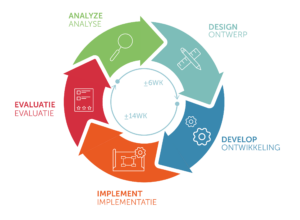Our courses are practice-oriented, with a focus on applying knowledge and skills in everyday work situations. This approach forms the foundation of our learning philosophy. We utilize blended learning in our courses to achieve optimal learning outcomes, combining engaging in-person sessions with a digital learning environment.
Through this platform, you can practice the course contents and share knowledge. During lessons, the emphasis is on practical application of knowledge and skills.
Inspiring interactive lessons
We maintain a strong connection with daily practice, which we consider essential because it serves as the basis for inspiring sessions. You master the theory through self-study, and in the lessons, the focus is on applying that theory and sharing experiences. The trainer plays a crucial role in this process. All our trainers are true subject matter experts from the water sector. As specialists, they share their knowledge and experience, illustrate theory with practical examples, and most importantly, they communicate in the language of the field. In the lessons, you will also meet fellow participants from the sector, helping you to build a network and learn from each other.
Digitale World Water Academy(DWO)
Access to our online learning platform is an option for tailor made courses. This platform supports your learning process with important information about the course. Here, you will find course materials such as e-learning modules, videos, and presentations. You can also take a practice exam, engage in discussions with fellow participants, and ask questions to trainers. This digital platform provides various ways for participants to engage with and master the course material.
Action Learning
World Water Academy uses Action Learning as a powerful and dynamic approach to education.
Here’s why:
